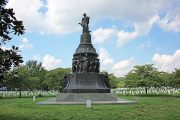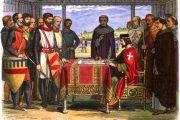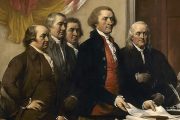There is little doubt that the nation of China has enormous potential and that Chinese civilization has had a profound influence upon the rest of eastern Asia. Several of the world’s moral and metaphysical systems — Taoism, Confucianism, Mahayana Buddhism, among others — either originated in China or flourished there. China is a huge amalgamation of different spoken languages, as well as such diverse land areas as tropical rainforests, soaring mountain ranges, glaciers, vast rivers with terraced farmlands in their valleys, and formidable deserts.
One out of every five human beings alive is Chinese. China’s area is incredibly vast — only Russia and Canada are larger. Its history stretches back to the earliest days of settled man. The four areas in which civilization first took root were the Nile area of Egypt, the Sumerian area around the Fertile Crescent where the Tigris and the Euphrates Rivers meet, the Indus River in western India, and the Yangtze River in China. People in the first three areas had significant contact with each other; however, the Chinese civilizations developed largely independent of the other three, looking eastward toward the Pacific Ocean rather than south and west toward the Indian Ocean.
Europe and the rest of the West have long been anticipating what would happen when China “awoke.” There is little doubt that the industrious and thrifty people of China, formed closely around strong family life, and living in a society which first gave the world many technological breakthroughs — the magnetic compass, gunpowder, the printing development known as movable type, among other inventions — could be as powerful as any nation on the planet. Whether that power would be used to good or for ill has been an important question over the last few centuries.
For several hundred years Christians have viewed the conversion of China to Christianity as extremely important. Countless missionaries to this vast Asian land selflessly devoted their lives to this goal. Some of them, such as young John Birch — who was born in Asia and died in China — gave their lives for the sake of the souls of the Chinese and the battle against totalitarianism, first Japanese Imperialism and then Mao’s Marxism. John Birch, killed in an ambush by Chinese Communists several days after the end of World War II, was the first victim of the Cold War.
One hundred years ago, January 1, 1912, Dr. Sun Yat-Sen (pictured above), trained in Christian universities and quite familiar with America, brought unity, independence, and Christian faith to his homeland, and the Republic of China was born. Chinese workers all over the world, visited by Dr. Sun Yat-Sen, gave pennies from their hard-earned wages to help support the establishment of a China controlled by the Chinese people.
The policies of the new republic were prudent and bore some resemblance to what Americans had established with their new republic. The Chinese Republic sought no territorial aggrandizement and desired no empire. Although there were outstanding issues — such as the Japanese presence in Korea and Taiwan, the British in Hong Kong, and the Portuguese in Macao — the Chinese republican government sought negotiations to resolve those questions.
Dr. Sun selected Chiang Kai-shek to replace him as head of the Party of the People (usually translated by those who try to portray Chiang in a negative light by the more sinister-sounding name “Kuomintang.”) Chiang visited Japan, Moscow under the Bolsheviks, and the United States as well. Although he welcomed help from any nation that offered it, he soon realized that the communists within the Kuomintang could not be trusted, and he suppressed them.
What followed was a long, bloody struggle in which American communists helped sabotage Chiang and the Kuomintang through a variety of malicious tactics. Gold promised by Congress to support the currency of the Chinese Republic was withheld until it was too late. Mao Tse-tung was glorified in America as an “agrarian reformer” while Chiang was demonized as a medieval warlord. China, whose help was indispensable in WWII, was excluded from the major summits (while Stalin, who helped Hitler for much of the war, was given a seat of honor).
The dream of a free, Christian Republic of China was lost in 1949, when Mao’s communist armies drove Chiang out of the mainland to the island of Taiwan. Chiang’s forces had been denied weapons through an embargo declared by General George Marshall of the United States. Marshall boasted of having disarmed 39 of Chiang’s divisions “with a stroke of his pen.”
Over the last 63 years, the world has been afforded a clear view of the difference between the two governments. Taiwan, the Republic of China, has a per capita GDP about six times greater than that of the so-called “People’s Republic of China.” Taiwan has a functioning democratic government, and no Bamboo Curtain was ever required to keep Taiwanese from leaving the island. Though Mao was perhaps the greatest mass murderer in human history, Chiang engaged in no such actions. While he governed China, Chiang negotiated practical autonomy for Tibet; it was only after Mao took control that the genocide in Tibet began.
The United States fought two hot wars in Asia after WWII, and tens of thousands of young American men lost their lives on the frigid hillsides of Korea or in the fetid rice paddies of Vietnam in wars that would never have started if a peaceful and free Chinese Republic had been right next door. China under Mao fought a war with India in the early 1960s. Mao also engaged the Soviet Army in border clashes near the Amur River in the late 1960s. His successors fought a short war against Vietnam in the late 1970s.
While the world watched, brave Chinese students created their own replica of the Statute of Liberty at Tiananmen Square in 1989, only to have tanks of the Chinese Communist government intervene, as thousands of idealistic Chinese were hauled off for long terms in slave labor camps. Today China dumps goods made by those wretched slaves onto the markets of economies with free workers, and it attempts to tinker with free markets by creating monopolies on rare earth metals and then implementing quotas to limit the amount that non-Chinese companies may acquire.
The cost to the Chinese people and to rest of the world of having an enslaved, Marxist China has been staggering. But 100 years ago, in January 1912, it looked as if the dream of a prosperous, peaceful, free, and Christian China — with all the benefits that this would have brought to the whole world — would last much longer than half a century.




